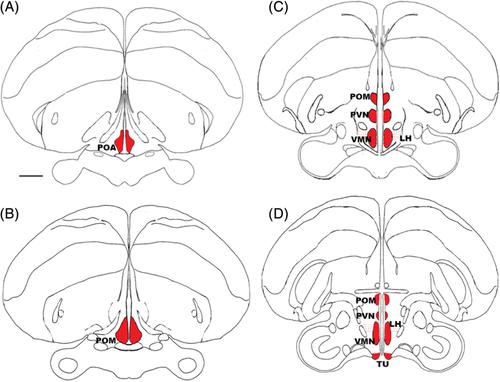当前位置:
X-MOL 学术
›
Genes Brain Behav.
›
论文详情
Our official English website, www.x-mol.net, welcomes your
feedback! (Note: you will need to create a separate account there.)
Examining the disconnect between prolactin and parental care in avian brood parasites.
Genes, Brain and Behavior ( IF 2.4 ) Pub Date : 2020-03-20 , DOI: 10.1111/gbb.12653 Kathleen S Lynch 1 , Matthew I M Louder 2, 3, 4 , Caitlin N Friesen 5 , Eva K Fischer 4 , Angell Xiang 1 , Angela Steele 1 , Julia Shalov 1
Genes, Brain and Behavior ( IF 2.4 ) Pub Date : 2020-03-20 , DOI: 10.1111/gbb.12653 Kathleen S Lynch 1 , Matthew I M Louder 2, 3, 4 , Caitlin N Friesen 5 , Eva K Fischer 4 , Angell Xiang 1 , Angela Steele 1 , Julia Shalov 1
Affiliation

|
Prolactin is often referred to as the “parental hormone” but there are examples in which prolactin and parental behavior are disconnected. One intriguing example is in avian obligate brood parasites; species exhibiting high circulating prolactin but no parental care. To understand this disconnect, we examined transcriptional and behavioral responses to prolactin in brown‐headed (Molothrus ater) and bronzed (M aeneus) brood parasitic cowbirds. We first examine prolactin‐dependent regulation of transcriptome wide gene expression in the preoptic area (POA), a brain region associated with parental care across vertebrates. We next examined prolactin‐dependent abundance of seven parental care‐related candidate genes in hypothalamic regions that are prolactin‐responsive in other avian species. We found no evidence of prolactin sensitivity in cowbirds in either case. To understand this prolactin insensitivity, we compared prolactin receptor transcript abundance between parasitic and nonparasitic species and between prolactin treated and untreated cowbirds. We observed significantly lower prolactin receptor transcript abundance in brown‐headed but not bronzed cowbird POA compared with a nonparasite and no prolactin‐dependent changes in either parasitic species. Finally, estrogen‐primed female brown‐headed cowbirds with or without prolactin treatment exhibited significantly greater avoidance of nestling begging stimuli compared with untreated birds. Taken together, our results suggest that modified prolactin receptor distributions in the POA and surrounding hypothalamic regions disconnect prolactin from parental care in brood parasitic cowbirds.
中文翻译:

检查泌乳生殖寄生虫催乳素与父母保健之间的脱节。
催乳素通常被称为“父母激素”,但也有催乳素与父母行为脱节的例子。一个有趣的例子是禽专性亲虫。种表现出高循环泌乳素但没有父母照料的物种。为了了解这种分离,我们研究了棕头(Molothrus ater)和古铜色(M aeneus)对催乳素的转录和行为反应繁殖寄生的牛bird。我们首先检查视前区(POA)中转录组全基因表达的催乳素依赖性调节,该区域是与整个脊椎动物的父母关怀相关的大脑区域。接下来,我们检查了下丘脑区域中七个与父母关怀有关的候选基因的催乳素依赖性丰度,这些基因在其他鸟类中对催乳素有反应。在这两种情况下,我们都没有发现泌乳素对催乳素敏感的证据。为了了解这种催乳激素不敏感性,我们比较了寄生虫和非寄生虫物种以及经催乳素处理和未经处理的牛鸟之间的催乳素受体转录本丰度。我们观察到棕头但非古铜色的牛鸟POA中的催乳素受体转录本丰度明显低于非寄生虫,并且在任何一种寄生虫中均没有催乳素依赖性变化。最后,与未处理的禽类相比,不论是否进行催乳素处理,雌激素激发的雌性棕头牛鸟都表现出更大的避免雏鸟乞讨刺激的能力。综上所述,我们的结果表明,POA及其周围下丘脑区域中的催乳素受体分布发生了改变,从而使育雏寄生牛鸟的催乳素与父母的护理脱离了联系。
更新日期:2020-03-20
中文翻译:

检查泌乳生殖寄生虫催乳素与父母保健之间的脱节。
催乳素通常被称为“父母激素”,但也有催乳素与父母行为脱节的例子。一个有趣的例子是禽专性亲虫。种表现出高循环泌乳素但没有父母照料的物种。为了了解这种分离,我们研究了棕头(Molothrus ater)和古铜色(M aeneus)对催乳素的转录和行为反应繁殖寄生的牛bird。我们首先检查视前区(POA)中转录组全基因表达的催乳素依赖性调节,该区域是与整个脊椎动物的父母关怀相关的大脑区域。接下来,我们检查了下丘脑区域中七个与父母关怀有关的候选基因的催乳素依赖性丰度,这些基因在其他鸟类中对催乳素有反应。在这两种情况下,我们都没有发现泌乳素对催乳素敏感的证据。为了了解这种催乳激素不敏感性,我们比较了寄生虫和非寄生虫物种以及经催乳素处理和未经处理的牛鸟之间的催乳素受体转录本丰度。我们观察到棕头但非古铜色的牛鸟POA中的催乳素受体转录本丰度明显低于非寄生虫,并且在任何一种寄生虫中均没有催乳素依赖性变化。最后,与未处理的禽类相比,不论是否进行催乳素处理,雌激素激发的雌性棕头牛鸟都表现出更大的避免雏鸟乞讨刺激的能力。综上所述,我们的结果表明,POA及其周围下丘脑区域中的催乳素受体分布发生了改变,从而使育雏寄生牛鸟的催乳素与父母的护理脱离了联系。











































 京公网安备 11010802027423号
京公网安备 11010802027423号